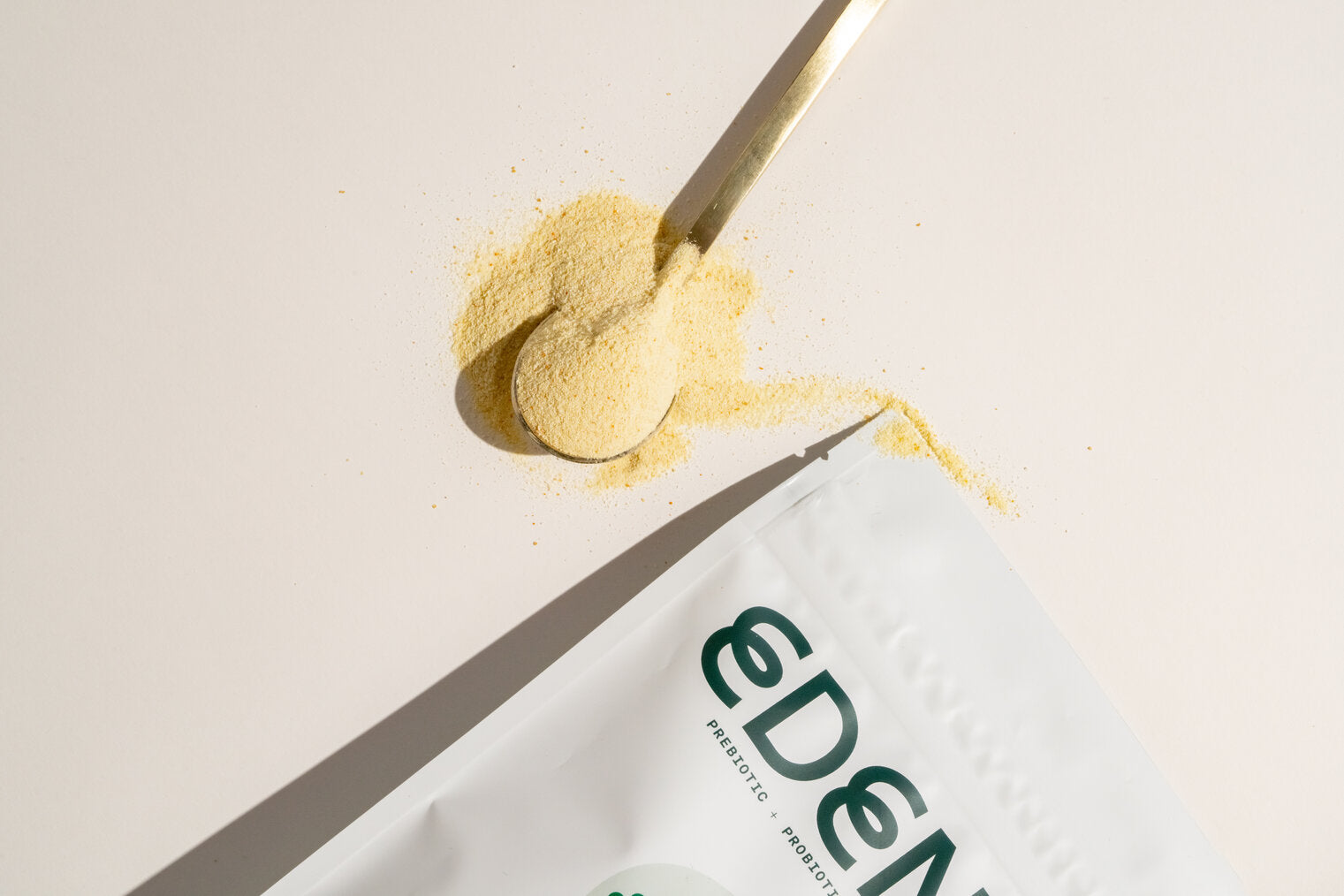Synbiotic supplements have become quite the buzz — and we should know, given Eden's is a synbiotic itself. But what is a synbiotic, exactly?
What is a synbiotic?
A synbiotic is a targeted blend of probiotics (“good” gut bacteria) and prebiotics (the non-digestible fibers that cause probiotic bacteria to grow and thrive) that has been proven to provide some health benefit to the host (you, the human). The term synbiotic comes from the Greek word “syn” (meaning “together”) and “biotic” (meaning “pertaining to life”).
Synbiotics have been a topic of hundreds of research papers since the term was first coined in 1995, and with a growing body of research pointing to the importance of gut health to overall health, the power and potential of synbiotics is increasingly being appreciated.
[[mailing_list]]
The distinct actions of probiotics and prebiotics
Probiotics are a class of bacteria (known as “good gut bacteria”) that confer a health benefit to the host, evidenced by better protection against metabolic diseases (such as obesity, insulin resistance and type 2 diabetes), cardiovascular diseases, certain cancers, and even neurological disorders. Some specific benefits include:
- Better digestion and increasing nutrient absorption
- Strengthened immune responses
- Reduced inflammation
- Improved mood, energy, sleep, and cognition
- Relief from the symptoms of many gastrointestinal diseases, such as antibiotic-associated diarrhea, inflammatory bowel disease (IBD), and constipation; respiratory diseases, such as asthma; viral infections, such as COVID-19; and skin conditions, such as eczema.
There are many different types of probiotic bacteria and they offer different benefits. Human probiotic microorganisms belong mostly to the following genera: Lactobacillus, Bifidobacterium, and Lactococcus, Streptococcus, and Enterococcus.
Prebiotics are non-digestible and fermentable fibers that promote probiotic colonization and growth by “feeding” the good bacteria in your system. They’re officially defined as, “A nonviable food component that confers a health benefit on the host associated with modulation of the microbiota.” Prebiotics don’t get broken down and absorbed — and instead end up in the colon, mostly unaltered, where they are then fermented by saccharolytic bacteria. The byproducts of their fermentation are compounds that stimulate probiotic communities and ultimately provide a wide variety of health benefits.
Different prebiotics will stimulate the growth of different probiotic bacteria, and how one works can depend on the dose, strain and how it’s ingested. Without prebiotics, probiotics can't thrive or reproduce. There is a significant amount of research showing the beneficial effects of prebiotics and their potential for modifying the gut microbiota.
Prebiotics are found naturally in a wide variety of plant-based foods, yet achieving an adequate intake from diet alone is not always easy. Supplemental sources of prebiotics have been researched for their safety and health benefits, with results pointing to potential health benefits — such as reduced risk of gastrointestinal dysfunction; reduced risk of chronic, low-grade inflammation linked to cardiometabolic disorders (such as diabetes and heart disease); improved glucose control; improvements in cardiovascular indicators (e.g., lower LDL cholesterol); and more.
[[product]]
Enter synbiotics
Synbiotics were developed to boost the benefits of probiotics — because as humans, we face a few challenges when trying to get the most out of what probiotics have to offer. Our guts are hostile environments, and probiotic bacteria have a hard time surviving for prolonged periods of time. Probiotics need constant food and nutrients to reproduce in our guts, so we have to regularly consume the right nutrients to prevent the probiotics from dying off, which would negatively alter our gut microbiome — with a ripple effect to the processes that depend on our gut microbiota. On the other side of the equation, prebiotics can’t positively impact the gut if the probiotic bacteria that ferment them are not already present.
Compared to the activities of probiotics and prebiotics on their own, the “enhanced” synbiotic product is designed to have a superior effect. By combining the right prebiotic and probiotics into one compound, a synbiotic should have greater potential to achieve and maintain a healthy gut by intensifying and elongating the function and efficacy of probiotic bacteria.
There are two categories of synbiotics based on how they’re formulated — complementary and synergistic:
- Complementary synbiotics combine established probiotics and prebiotics in their required dosage amounts, with every ingredient meeting minimum criteria for a probiotic or prebiotic. In order to be labeled as a complementary synbiotic, a research study must show evidence of a health benefit of the combined ingredients.
- Synergistic synbiotics can be composed of components that are, on their own, not eligible for probiotic or prebiotic status. To qualify as a synergistic symbiotic, a single study must demonstrate the selective utilization of the substrate and a specific health benefit, which is a more rigorous type of study than is performed on a complementary synbiotic. A synergistic synbiotic offers the potential of a previously non-qualifying microorganism to provide probiotic benefits if paired with the right substrate; likewise, it offers a previously nonviable substrate the ability to become a prebiotic when combined with the right bacteria. For example, a microorganism might have probiotic potential, but due to competition or other ecological and biological factors, it cannot function as one when ingested on its own. But when it’s combined with a suitable substrate, it could offer health benefits significant enough to qualify as a prebiotic.
Because synbiotics don’t have to be a combination of standalone probiotics and prebiotics, they offer a massive opportunity for research, innovation, and discovery.
Keep in mind: synbiotics are not the same as substances deemed to be symbiotic. Often used in a biological context, the term “symbiotic” refers to a prolonged ecological relationship usually of mutual benefit (although sometimes parasitic) to both organisms, in symbiosis.
Health benefits of synbiotics
Your gut microbiome is critical to how your metabolic, immune and neurological systems function. If you can improve your gut health, you can change the way your body responds to disease. Research has proven that it’s possible to modify your gut microbiome by ingesting specific probiotic bacteria and the prebiotic fibers they feed on, leading to a variety of improved health outcomes. Synbiotics are now being considered important tools in altering gut health because of the one-two punch they deliver, combining the benefits of probiotic and prebiotics in one fell swoop.
The health benefits of synbiotics include:
- Supporting digestive health: Synbiotics increase the amount of probiotic bacteria and digestive enzymes that support nutrient absorption, with demonstrated effects on calcium, magnesium and iron uptake. Synbiotics can help modulate gut microbiota into healthier states, which has a domino effect to just about every metabolic process, including significantly decreasing metabolic syndrome prevalence, reducing several cardiovascular risk factors (including weight loss), and reducing? biomarkers of insulin resistance. (Specific biomarkers are discussed further down in this list.)
- Decreasing gastrointestinal disease symptoms: Synbiotics have demonstrated efficacy in reducing gut inflammation and helping to reduce the symptoms associated with irritable bowel syndrome (IBS), irritable bowel disease (IBD), traveler’s diarrhea, lactose intolerance, and improving the treatment rate of Helicobacter pylori (a causative agent of gastric and duodenal ulcers).
- Improving immune function: Synbiotics have been used in postoperative patients to decrease infection and have been shown to have anticancer effects. They have also been shown to decrease concentrations of undesirable metabolites, cancerogenic substances, and nitrosamines. While mechanisms are not fully understood, scientists theorize that a synbiotic’s effects on gut microbiota occurs through “competitive exclusion”: promoting growth of probiotic bacteria that circulate lymphocytes and cytokines, which stimulates phagocytosis and ultimately allows probiotic bacteria to thrive and pathogenic bacteria to diminish.
- Decreasing Inflammation: Human studies have shown that synbiotic treatment can decrease biomarkers of inflammation.
- waist circumference
- fasting plasma insulin
- total cholesterol
- high-density lipoprotein cholesterol
- non-HDL-C
- triglycerides (TG)
- low-density lipoprotein cholesterol
- high-sensitivity C-reactive protein
- tumor necrosis factor alpha serum levels
- blood fat and sugar levels
Studies have suggested that synbiotics also may be effective tools in preventing osteoporosis.
Sources of synbiotics
Synbiotics are available in both food and supplement form.
Synbiotic foods can be made by combining prebiotic and probiotic-rich foods on a daily basis:
- Prebiotics sources include green bananas, acacia gum, garlic, asparagus, oats and barley.
- Probiotics are found in many fermented foods such as yogurt, kombucha, sauerkraut, and tempeh.
Some examples of synbiotic food combinations include:
- Bananas or blueberries with yogurt
- Fruit smoothie made with kefir
- A stir fry of tempeh with asparagus, garlic, and leeks
How to find the best synbiotic supplements
Eating a variety of nutrient-dense, high-fiber foods is the best way to make sure you are getting enough synbiotic sources, but taking a synbiotic supplement takes a lot of the work out of the equation. Supplements are not regulated by the Food & Drug Administration (FDA), so it’s important to find a food supplement from a reputable brand backed by scientific rigor. Always check with your health professional before starting a new supplement.
Look for products made with live and active cultures with a high CFU count. Plant-based fiber (such as potato starch, guar gum, barley, oat bran) will offer up the prebiotic benefits. Also, because different combinations of synbiotics may offer different benefits, take a look at what benefits the product is offering; there may be differences across product comparisons.
Dosage guidelines differ among various synbiotic products, and are determined by the clinical studies that were conducted on them prior to marketing. When you’re starting off with a synbiotic, it’s best to do it slowly and with plenty of fluids. A sudden surge in probiotics and fiber can cause gas, bloating or even constipation.
Eden's synbiotic is a precise balance of all-natural prebiotics, probiotics, and polyphenols that are combined to optimize the functioning of the human gut microbiome. Eden’s has demonstrated associations with better glycemic regulation, lipid control, stronger immunity, and increased digestive comfort and feelings of satiety.
Key takeaways
What is a synbiotic? A synbiotic is a blend of probiotic and prebiotic components that work in concert to develop and fuel select health-promoting probiotic bacteria in the colon. The dual-action activity of synbiotics may make them more effective at improving the balance of microbiota in your gut than if you ingested these components separately. The importance of a healthy gut cannot be understated: your gut impacts nearly every organ system in your body, so consider nourishing and strengthening it by adding synbiotics to your daily diet. Found in foods by pairing high-fiber (prebiotic) and fermented (probiotic) food products, synbiotics are also available as supplements. Eden’s synbiotic offers specific health benefits — including improved indicators of digestive, cardiovascular, immunological, and overall metabolic health — based on clinical research.

